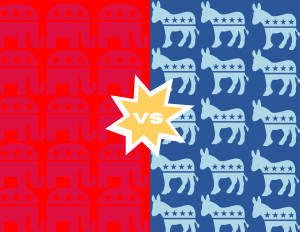Blind anger, utter complacency, or misguided optimism
June 1, 2016
Voters can have the ireful populist rhetoric of the presumptive GOP nominee Donald Trump, they can have what would essentially be a continuation of the past twenty years in the form of the Secretary of State Hillary Clinton, or vote for a previously tried and failed, admirable, but impossible economic system vowed by Vermont Senator Bernie Sanders. What is interesting in the upcoming election compared to previous elections is that each candidate is notably flawed in their own way.
Entire books could (and surely will) be published about the potential presidential candidacy of Donald Trump. Voters have witnessed nothing less than history in experiencing the Trump’s ascension to political stardom and many of the world’s most informed political minds have commented on his campaign thus far. As such, it seems appropriate to focus on an issue with Trump’s campaign that isn’t regularly addressed.
Trump is a protectionist.
Trump has, on multiple occasions, expressed his intent to implement sizeable tariffs on foreign goods imported to America, which he sees as a way to strengthen the economy and ensure American companies look to its citizens for employment, thereby reinforcing his promotion to use domestic good.
Interestingly enough, Sen. Sander’s stance on trade and tariffs is nearly identical to Trump- he too seeing taxing imports as a means of supporting American jobs and industry.
In no way is this sort of thinking new- it can be traced back to the economic ideals of the mercantilists of 16th century Europe. The result however, is appears to be always the same. Protectionism creates what economists call a dead weight loss. This loss occurs because protectionism disallows the use of comparative advantage. When we allow trade to be free, each country will produce what they are best at producing so as to export it and earn a profit, Thailand produces rice, France produces wine, etc, and these goods are traded internationally between companies in different countries thereby allowing the consumers in each country to have access to the highest quality of a particular good despite perhaps not living somewhere where said good is produced. Under a system of protectionism however with high tariffs on foreign goods, a country is forced to produce all the goods to satisfy the needs and wants of consumers. This causes two major problems.
One, prices on many goods go up, as there are always, for a variety reasons be they geographical, political or others, going to be some goods that another country is able to produce more cost effectively. The second issue is that while costs goes up, the quality of many goods will likely come down. While the motivations behind both Sanders and Trump’s protectionist policies are understandable perhaps even laudable, the loss incurred by protectionism greatly outweighs what is gained. Economics aside however, protectionism is morally wrong. Protectionism is your government telling you “No, you can’t spend your money there you have to spend it here.”
Not just trade, but economic policy in general seems to be a very peculiar aspect of this race, particularly that of Sen. Sanders. Sen. Sanders is valid to put great importance on issues like income inequality and crony capitalism. There is, however, a fundamental error in the solutions Sen. Sander’s sees in these issues: His democratic socialist ideology argues that these issues and many other should be dealt with through expanded government, increased regulation, and more federal involvement.
Income inequality has been a direct result of the uncontrolled printing and borrowing by the Federal Reserve. Every minute of every day, new money is being printed, thus lowering the value of the money every day people have in their wallets and bank accounts. Raising the minimum wage would not do anything to help this, it may lift people up temporarily (at cost of making it more expensive to operate a business) but if the Federal Reserve continues with this uncontrolled printing and borrowing, eventually, as has happened now, inflation will outgrow wages and in a number of years the exact same argument about needing to raise the minimum wage will reoccur. In order to fix income inequality, there needs to be massive reform in monetary policy so as to prevent the Government from continuing to rob the working class through inflation carried out by the Federal Reserve.
Then of course we have the current candidate, and at this point is probably fair to assume as the presumptive democratic nominee Hillary Rodham Clinton. One could rack their brain for hours and struggle to find one positive thing to say about Secretary Clinton. Obviously there’s the various scandals, be it Whitewater Real Estate, Libya, her email servers, or any of the others she’s been involved in. Then there are her many clear and undeniable flip-flops on various issue over the years. What’s more off putting about her however, is that she represents what the worst part of both parties. On the economy she is a watered down less genuine version of Sanders. On her foreign policy, Secretary Clinton may as well be John Mccain or George W Bush. While she was secretary of state, the U.S. military [unprovoked] entered Libya dispose of its leader and create a “democracy.” She has also promised to set up no-fly zones in Syria, which would most likely lead to eventual armed conflicts. Does this not sound more like the foreign policy of a neoconservative military hawk like John Mccain or Lindsey Graham, as opposed to a progressive democrat?






